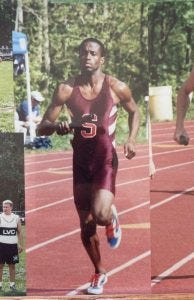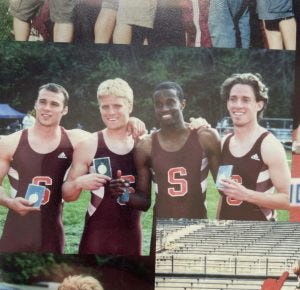I Ran A Half-Marathon 1% Faster For 10 years To See What Would Happen
Can you get faster by trying just a little bit less?
This is a story about what happens when you get one percent better year after year for ten years. Follow me on this ambitious journey as I run for my life to literally become the best version of myself and discover the true power of becoming one percent better. So the next logical question is, why do I even run?
I'll answer that and more in the next part of this one percent better journey.
Like other content formats? Watch and listen to the video or audio version on your next run.
Why did you start running?
What was the catalyst for getting into all this run culture and everything we do? For me, it wasn't for weight loss. It wasn't to run some epic event. There were three specifically weird things that I have yet to hear other runners talk about.
Ultimately, I've been chasing and keeping chasing a romantic feeling for as long as possible, but I've narrowed it down to three reasons. One was to biohack myself to answer one question, which I'll get into, to become more mindful. And three, the pillars of everything one percent better are belief, focus, and patience.
I'll get into all those things shortly.
What you'll learn
I'll start with what I'm actually doing and this whole 1 percent better thing
Then, go into the core pillars and mindsets around why this is so important
Why not the 10k and marathon
The rules of this whole game test experiment
Where it all came from
Why I run
The one percent better theory
How you can use this for your training, racing, and life, and much more
The reason why I run
I realized most people don’t know why I started running. It wasn’t for weight gain or to run some epic event. There were three specifically weird things that I have yet to hear other runners talk about, and ultimately, I want to chase and keep chasing a romantic feeling for as long as possible.
1 - Biohacking myself to answer one question
2 - To become more mindful
3 - The pillars of everything 1% better: Belief, Focus and Patience
Cal Newport on the compound interest of slow growth
PHD professor of computer science, NY Times best-selling author and technology productivity contrarian Cal Newport has a great quote. In his latest podcast episode about Seinfeld, he sums up, very succinctly, an idea I’ve had bouncing around my head for years.
He said, “Interviewers ask me, you do this, and you do that. This feels like you would be very busy. How can you fulfil the first principle in the book to do fewer things if you are writing books, podcasts, etc.?
But my answer is that I don’t do all of them at once. I’m very seasonal.
If I’m writing a book, I’m not doing other things
That pacing over time is incredibly powerful.
It’s like compound interest with money. It’s boring this month, but when you fast forward to 10 years of doing the same thing, you have a lot of money in your account.
You keep making progress on things. You don’t have long down periods, and you don’t overload yourself.
That’s the sweet spot when things really stack up.”
Biohacking myself to answer one question
Let’s rewind it to when I ran track 20 years ago in college. I just got moved up to middle distance from sprinting. My coaches saw that I was stronger in the longer intervals than the sprint guys, so they thought I could try the 800m event. I got really close with a super strong 800m and 1500m runner named Shane. Before the first race of the year, all the distance guys were hanging out in someone’s dorm room about to watch the “hype up” distance running movie. Remember, this is 2002, so there was no YouTube running channel to get hyped on.
The movie was Steve Prefontaine's Without Limits, but it was the first one, aka the good one, not the Jared Leto one.
I’ll never forget the one thing Steve Prefontaine said casually to another runner.
“Let’s just go and run an easy ten-miler at a five-minute pace”.
As I started to do long runs and longer intervals with the distance guys, I thought, “Well, how the hell does someone get so fit that they can run an easy 10-mile run at a 5-minute pace?”
Twenty years later, I’m still trying to answer that question by experimenting on myself, talking to experts and researching the hell out of how I can do that.
To become more mindful
Running mindfully is a thing
Sitting still and meditating is a thing
Is there a middle ground? Can I do one and enhance the other?
Running helps me get closer to that answer
Accountability & Control
Belief, focus, and patience seem to be the core pillars of my life's success. I applied these principles to running, and I’m now realizing their power.
If I show up daily, weekly, monthly, quarterly and yearly - I win.
I also control the outcome of running and my own fitness and health goals.
No one else. Just me, my training consistency, nutrition, recovery and my genetics.
Most things in life are affected by other people, but with running and my health and fitness, I control them.
Ironically, getting my fitness and health right affects all the other things in my life because it’s all the same.
Why 1% better is important: Zooming out
“People overestimate what they can get done in a day and underestimate what they can do in a decade.”
It teaches me to slow down: all haste with no speed. Life is long, but I need a sense of urgency, as you never know when it’s your turn to end the race.
FAQ Rebutles - Why not other races like a 10k or marathon?
Why not the marathon? It's too hard on my body. I’ve tried it, and it’s too much risk and input for too little output and reward.
The 5k or even 10k is “too easy” and short for me to do this 1% thing. I'm not saying a 10k is easy, but this was the middle ground between kind of easy and kind of hard.
To keep me focused on something very challenging, my main “A-race” since 2018 has been running a sub-16-minute 5k. Most of that training can be used to stay relatively fit for a half marathon.
I wanted the long runs for this leading up to the race each year to stretch me but not smash me—just enough challenge but not too much - Goldilocks zone. Marathon is where it becomes diminishing returns.
What I did that you can try
If possible, pick a distance or race you have control over. I picked the half marathon because I knew I could do that distance comfortably, train for it in 6 weeks with whatever fitness I had, and do a DIY version of it anywhere.
Commit to this for ten years.
Expect to have an off year or two. Always try to show up, even if you walk the event. Making it a DIY event allows you to move things around in your life because life is always happening.
The Rules
Every good challenge and game needs guardrails and rules, so here are some.
Use whatever fitness I have at that time
Can only specifically train for it for up to 8 weeks out, preferably six weeks
I need to work it around my life and not make it a main event
I cannot specifically train for it for weeks on end
It’s okay to go backwards; life happens. The goal is to show up each year for it
Make it hard enough to be challenging but not too easy to be bored
Highlights of what happened
2017 - 1:31:40 - Super excited and set the goal to get down to 1:21: (technically, it’s 1:22:34, but rounding it out to 10 minutes overall and one minute per year is nice and round)
2018 - 1:25 - Huge jump, thought I would run 1:22 by next year
2019 - 1:24:01 - I had some achilles issues leading up, and the race was super hilly, but I looked down at my watch and saw 1:24 and was pleasantly surprised
2020 - Too many issues with Covid, the little dude getting sick, me getting sick, etc. I didn’t do anything that year. While I don’t regret it, I should have just made it an easy long run. I won’t ever do a zero-year again.
2021 - I'm not sure of the time—I ran a DIY Half Marathon around a 1-mile (1.63km) flat loop, and my watch failed mid-race. Based on whatever data I had, I estimated between 1:27 and 1:29.
2022 - I finally hit 1:22, so I technically got my goal, but not really. I need to touch 1:21
2023 - 1:23:30 - I wasn’t as fit as I thought I would be due to the realization that I needed to take a break from the 5k. I ummed and ahhed about even doing this race, but six weeks out I decided to give it whatever fitness I had and I’m glad I did. This proves that “feeling unfit” differs from what your body can do when needed.
What’s next & predictions moving forward
While 1:21:59 is what will tick this box, like all runners, I have an even sexier round vanity number- 1:19:59. Sub 1:20 sounds fantastic. It might take a bit more than just randomly showing up for a race every year race with whatever fitness I have.
Ironically, this distance is perfect for when I focus on the marathon when this ends and I turn 44.
Thoughts Moving Forward
While some people get excited about running streaks and others about dropping 45 minutes off their best time the second time doing the race, that doesn’t excite me. I’m not mad at them, and to each is their own.
I like this 1% better each year, 10% better after a decade approach. It’s slow growth. It’s boring and not sexy. And that’s sexy. It allows me to zoom out and have perspective, let life happen, and not be so damn hard on myself.
I really believe this will give me the foundational confidence and discipline to apply it to all areas of my life.
Not into 1% better? What would you rather do? What did I miss? Are you doing anything similar to this? Reply to this or talk@dlakecreates.com and let me know.









